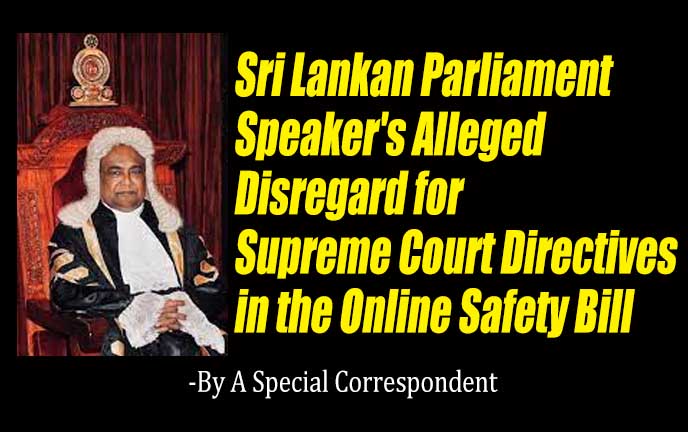-By A Special Correspondent

(Lanka-e-News -05.Feb.2024, 10.00 PM) In a startling turn of events, Sri Lanka finds itself embroiled in a constitutional crisis as allegations surface that Parliament Speaker Mahinda Yapa ignored Supreme Court directives while signing off on the controversial Online Safety Bill. This article delves into the multifaceted dimensions of this unfolding saga, exploring claims of authoritarianism, contempt of court, and international backlash.
1.1 Members of opposition parties raise concerns over the hasty passage of the Online Safety Bill, highlighting a lack of inclusion of Supreme Court-mandated amendments. The court's directives, issued in response to 45 fundamental rights petitions, form the backdrop of this contentious debate.
1.2 Public outrage intensifies as citizens, asserting their sovereignty, express vehement objection to the perceived disregard for Supreme Court guidelines. The potential threat to freedom of expression is emphasized, urging a rejection of the bill in its current form.
1.3 Addressing Speaker Yapa, calls are made for the incorporation of Supreme Court-directed amendments before endorsing the Online Safety Bill, underscoring his responsibility to uphold parliamentary orders.
2.1 Opposition MPs argue that the alleged bypassing of Supreme Court directives not only violates the Constitution but also undermines the sovereignty of the people, potentially leading to contempt of court. Speaker Yapa's decision to gazette the Online Safety Bill despite court directives is condemned as a deliberate and calculated act.
2.2 An exploration of Sri Lankan contempt laws, rooted in English legal traditions, sheds light on the potential legal consequences for Speaker Yapa. The article details the summary procedure for contempt cases and the powers vested in the Supreme Court and Court of Appeal.
3.1 International criticism mounts as activists, civil society members, and the UN Office of the High Commissioner on Human Rights denounce the Online Safety Bill for its perceived chilling effect on freedom of expression.
3.2 The United States expresses concerns over the bill's impact on democratic values and economic growth. Ambassador Julie Chung urges transparency and emphasizes the need for legislation that does not stifle the voices of the people.
3.3 The Asia Internet Coalition (AIC), representing major tech giants, brands the bill as draconian, raising concerns about its potential to suppress dissent and hinder public discourse. The International Commission of Jurists (ICJ) warns of further curtailment of free expression and civic space in Sri Lanka.
3.4 Major tech companies issue warnings to the Sri Lankan Government about potential restrictions on online services, while the booming tourism sector faces warnings from multiple countries.
3.5 Foreign investors and international trade bodies threaten severe consequences for the bill, reflecting global concerns about its impact.
4.1 Former President Chandrika Bandaranaike Kumaratunge calls for the withdrawal of the Online Safety Act and the Anti-Terrorism Bill, labeling them as dangerous acts that could violate people's fundamental rights. Her social media statement urges democratic action against these laws.
4.2 Chandrika contends that existing laws are sufficient to address false news and political instability, emphasizing the unnecessary nature of the proposed legislation.
5.1 Damaging allegations surface, suggesting that Speaker Yapa rushed to legalize the Online Safety Bill to divert attention from his failure to address sexual harassment within the Sri Lankan Parliament.
5.2 Critics argue that Speaker Yapa failed to launch a meaningful investigation into the reported sexual harassment, leading to calls for his resignation from opposition and senior politicians.
5.3 The urgency to enact the Online Safety Bill is scrutinized as potentially politically motivated, aimed at countering opposition ahead of forthcoming elections.
As Sri Lanka grapples with the implications of the Online Safety Bill, this article aims to provide a comprehensive exploration of the alleged actions by Speaker Mahinda Yapa. From claims of authoritarianism and contempt of court to international backlash and allegations of a cover-up, the situation raises critical questions about the state of democracy and governance in the country.
---------------------------
by (2024-02-05 17:01:36)
Leave a Reply